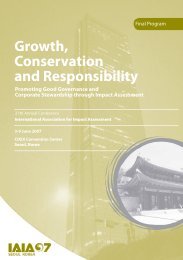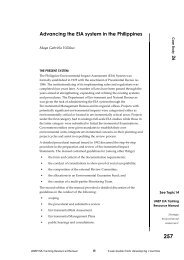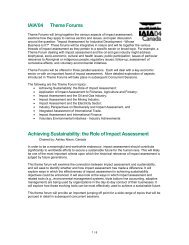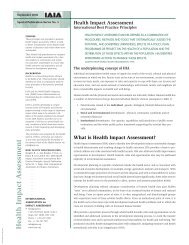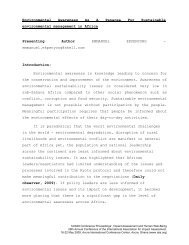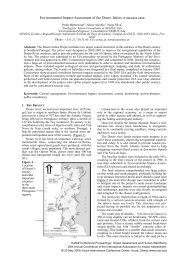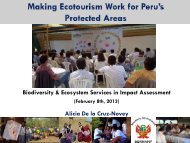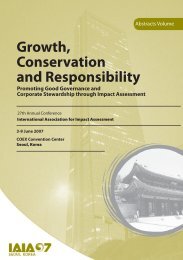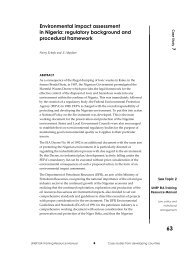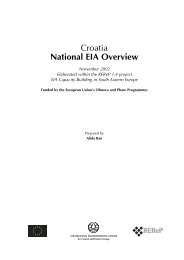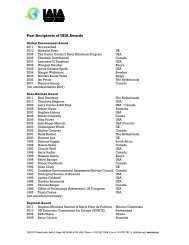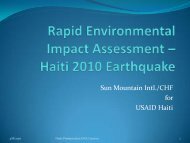Session Report [PDF] - International Association for Impact Assessment
Session Report [PDF] - International Association for Impact Assessment
Session Report [PDF] - International Association for Impact Assessment
Create successful ePaper yourself
Turn your PDF publications into a flip-book with our unique Google optimized e-Paper software.
28th Annual Meeting of the <strong>International</strong> <strong>Association</strong> <strong>for</strong> <strong>Impact</strong> <strong>Assessment</strong><br />
THE ART AND SCIENCE OF IMPACT ASSESSMENT<br />
IAIA08 <strong>Session</strong> Chair’s <strong>Report</strong><br />
This in<strong>for</strong>mation will be included in the on-line conference proceedings and will provide input to the IAIA Study of the<br />
Effectiveness of Environmental <strong>Assessment</strong> Update<br />
.<br />
<strong>Session</strong> number and name: TF 2.3 Environmental Mainstreaming in National Development<br />
Plans<br />
Day: Wednesday Date: 7 May 2008 Time: 8:30-10:00 # Persons attending session: Approx 50<br />
Name(s) of <strong>Session</strong> Chair(s)<br />
David Annandale<br />
Contributors<br />
Dr David Annandale, Professor Leonard Ortolano, Dr Barry Dalal-Clayton, Jon Hobbs<br />
(a) Three current issues in application of assessment processes discussed in this<br />
session<br />
<br />
<br />
<br />
<br />
<br />
What progress have we made with mainstreaming the environment in national<br />
development planning?<br />
Is there evidence that mainstreaming is leading to positive environmental outcomes?<br />
What tools/techniques are being used around the developing world <strong>for</strong> integrating<br />
environmental issues into high-level planning?<br />
What are the hurdles facing better consideration of environmental issues in national<br />
development planning?<br />
What role does/can SEA play in encouraging environmental mainstreaming?<br />
(b) One or more emerging trends<br />
Environmental mainstreaming is a more appropriate term to use than SEA, when applied<br />
to the ex-ante <strong>for</strong>m of SEA. This is because some decision-makers see ex-ante (wrongly)<br />
as a project EIA- type regulatory hurdle. The term “environmental mainstreaming” does<br />
not seem to have the same connotation.<br />
(c) Issues relating to impact assessment effectiveness:<br />
(i) dimensions of IA effectiveness (i.e. what are the characteristics of effective IA?)<br />
With regard to environmental mainstreaming and national development planning…<br />
effective EA is when environmental issues are examined at the same time as economic<br />
and social issues in high-level strategic planning.<br />
(ii) challenges/barriers to IA effectiveness<br />
With regard to environmental mainstreaming …the techniques need to be understood and<br />
championed by bureaucrats from finance/strategic planning ministries. There is a<br />
“terminology” problem as well. Too many terms that are misused, or not properly<br />
understood in developing countries.
(iii) how these barriers might be overcome<br />
Awareness raising.<br />
Examples of environmental mainstreaming benefiting the national development process<br />
(eg the Ghana case).<br />
Academic work to simplify terminology.<br />
(d) Comments on the Art and Science of <strong>Impact</strong> <strong>Assessment</strong> (i.e. the relative<br />
importance and interplay between science and values/politics/subjectivity in impact<br />
assessment)<br />
This <strong>for</strong>um appeared to be at the heart of the “art and science” issue. At the level of national<br />
development planning, most focus is on IA as art. This is especially the case in countries where<br />
environmental in<strong>for</strong>mation is rudimentary. The current struggle is to have decision makers accept<br />
the importance of “environmental infrastructure” (or “capital”) as a pre-condition <strong>for</strong> efficient<br />
development. There is a need to recast SEA in its ex ante <strong>for</strong>m, to endure that it see as an aid to<br />
economic efficiency ... and not as an additional regulatory hurdle.


![Session Report [PDF] - International Association for Impact Assessment](https://img.yumpu.com/22416146/1/500x640/session-report-pdf-international-association-for-impact-assessment.jpg)
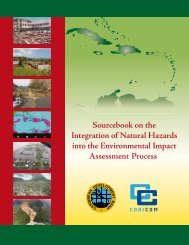
![Session Report [PDF] - International Association for Impact Assessment](https://img.yumpu.com/22416140/1/184x260/session-report-pdf-international-association-for-impact-assessment.jpg?quality=85)
